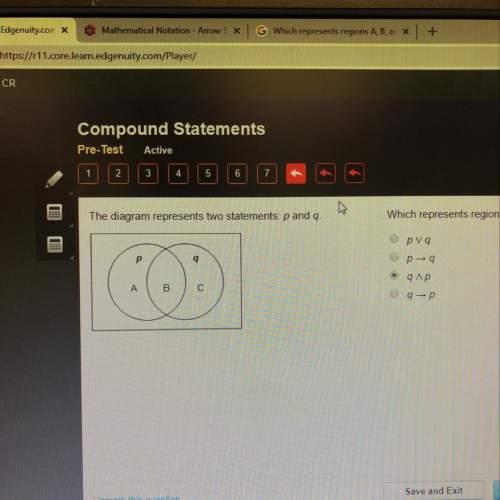
Mathematics, 04.08.2020 19:01 montimcdaniel
The joint density function for a pair of random variables X and Y is given. f(x, y) = Cx(1 + y) if 0 ≤ x ≤ 4, 0 ≤ y ≤ 4 0 otherwise f(x, y) = 0
A) Find the value of the constant C. I already have 1/24.
B) Find P(X < = 1, Y < = 1)
C) Find P(X + Y < = 1).

Answers: 3


Another question on Mathematics

Mathematics, 21.06.2019 16:00
Apatient is to take 60 mg of an antibiotic on day 1, take 45mg on days 2 and 3, take 30mg on days 4 and 5 and take 15 mg on days 6 and 7. how many total mg will the patient take?
Answers: 1

Mathematics, 21.06.2019 18:00
Suppose sat writing scores are normally distributed with a mean of 497 and a standard deviation of 109. a university plans to award scholarships to students whose scores are in the top 2%. what is the minimum score required for the scholarship? round your answer to the nearest whole number, if necessary.
Answers: 2

Mathematics, 21.06.2019 19:10
What is the quotient of m^6/5 ÷ 5/m^2? assume m does not equal pl
Answers: 1

Mathematics, 21.06.2019 20:00
Evaluate the discriminant of each equation. tell how many solutions each equation has and whether the solutions are real or imaginary. x^2 + 4x + 5 = 0
Answers: 2
You know the right answer?
The joint density function for a pair of random variables X and Y is given. f(x, y) = Cx(1 + y) if 0...
Questions

Biology, 27.02.2021 20:10

Health, 27.02.2021 20:10

Mathematics, 27.02.2021 20:10


Mathematics, 27.02.2021 20:10

Mathematics, 27.02.2021 20:10

Mathematics, 27.02.2021 20:10



Biology, 27.02.2021 20:10



Mathematics, 27.02.2021 20:10

History, 27.02.2021 20:10

Mathematics, 27.02.2021 20:10

English, 27.02.2021 20:10




Mathematics, 27.02.2021 20:10




